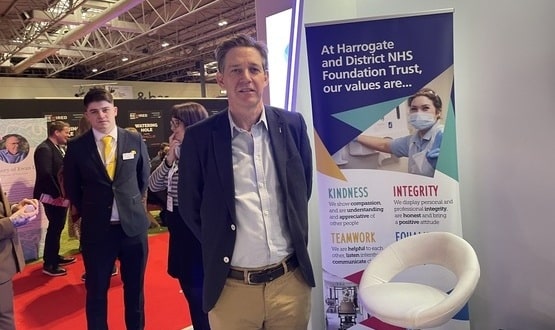Patients Knows Best lets Surrey view single care record
- 2 May 2017

NHS organisations across Surrey have begun using patient-controlled personal health record technology to allow clinicians to view a single digital care record across four NHS trusts, GPs and four clinical commissioning group areas.
Within six months, clinicians working in Surrey will be able to see a shared integrated record from all the different health organisations using shared record technology supplied by Patients Know Best.
Once health professionals have begun using the shared PKB record the next step will be to extend it to patients as well. The initiative is expected to eventually cover one million people across the county.
Steve Abbott, programme director for Surrey Heartlands local digital roadmap, said he wants PKB to give “our clinicians access so that our carers have the best information at hand to deliver care at the point of delivery”.
But, one of the challenges with that is “getting the information governance consent right, because there are some different expectations out there about what patients expect from consent”.
The project builds on Surrey and Sussex Healthcare NHS Trust existing work with PKB that uses patient-controlled records for its 3,200 inflammatory bowel disease patients.
Abbott said having one integrated digital care record would mean that patients would not have to repeat themselves, each time the have to deal with a difference health professional or encounter a different part of the health service.
“They’re [clinicians] actually working with the latest data that’s available, so they’re not asking questions that have already been asked.”
PKB is already used in a similar way by the Care Information Exchange in north west London, where it was rolled out in November 2016.
Abbott said the announcement was “the first step in a long interoperability journey” for the area.
In a statement Abbott added that the fact the PKB solution was approved for use across the NHS network, N3, and worked on network-hosted architecture “allows us to deliver quickly at low cost.”
Julia Ross, chief executive at North West Surrey CCG and transformation board sponsor of the digital work stream for Surrey Heartlands described the initiative as a “great leap forward”.
“This will facilitate better integration of IT systems to provide more efficient care and improved information sharing.”
The health organisations signed up to the Surrey shared record project are:
- All GPs in Surrey, except those in the Surrey Heath district
- Surrey and Sussex Healthcare NHS Trust
- Royal Surrey County Hospital NHS Foundation Trust
- Epsom and St Helier University Hospitals NHS Trust
- Ashford and St Peter’s Hospitals NHS Foundation Trust
- North West Surrey CCG
- Guildford and Waverley CCG
- Surrey Downs CCG
- East Surrey CCG





9 Comments
the problem with health care records and services are the attraction to the resale of private hacked data. there is estimated that million health records are for sale on the dark web already. Consolidation of data especially under government control has never been a good idea in the time of rising cycber threats. Cloud also causes great privicy concerns not only saas but communications too.the cyber experts hold the view that silo systems behaviour security add the necessary security in a historcally poor performing sector. Clearly it vendors push for consolidation to gain commercial advantage.it has no advantage to the longerterm vision for security and procurment control.
Have looked at this for our STP. Looks really really promising and can’t see any down sides. They have cracked the IG issue. The patient portal bit for patient engagement looks excellent (assuming the patient has any interest in IT). Patients having access to their test results and appointment times is huge for patient engagement and should if nothing else reduce DNA rates. Trying to get other colleagues as enthusiastic when we have significantly invested on similar projects is the understandable dilemma. If PKB showed willing to collaborate with live projects in different regions and used that as a selling point, they’d gain a lot more rapid traction in the NHS. Getting patients electronically engaged in chronic conditions through a patient portal, linking that to approved online forums and health apps and patients taking their own vitals is the key to reducing access to prim/sec care clinics and reduced emergency attendance and saving the health economy £££. I’d like to some more of that development from PKB but they seem to be leading the way at the moment. Think they have started on that line now I believe eg IBD.
Having looked into it a bit deeper, it doesn’t appear that there will be patient consent for the information to be uploaded in the first instance, and there certainly is no patient information programme in progress to warn people. Will the NHS ever listen to itself and try to get things right?
“But, one of the challenges with that is “getting the information governance consent right, because there are some different expectations out there about what patients expect from consent”
Well, if you ask a patient for their consent, then you’ll be getting the information governance consent right. Obvious really.
And while we are at it why not make information sharing among organisations the default and negotiate opt out rather Gotham the other way round? Follow the model of organ donor cards and make opt in the default.
Hi Andrew
Which organisations should have which information across how wide an area by default?
You are right that most patients want their doctor to share information with their local hospital. (In fact most patients assume and expect this is already happening.)
But patients receive care from many other parties, including hospitals further afield. All these parties – and the patient – benefit from information sharing. Default sharing for a few is not enough, but with patient control you can share with many: just ask the patient, they will say yes.
You also need granularity in sharing. PKB classifies each data point as one of general, sexual, mental and social care. You can then get consent for different teams accessing different data sets across all of health and social care.
Patient control is the only way to deliver information sharing at scale.
Mohammad Al-Ubaydli
CEO, Patients Know Best
Mohammad,
We need not to forget that in some cases patients also need to be able to share records, appointments letters etc with their carers or those with “power of attorney” .
I’m speaking from recent experience here where I have to contact each department my mother comes in contact with at each Trust to ensure they send me appointment details, follow up letters as her GP is unable to do this on my behalf, haven’t even got to using Social Care yet 🙂 , just acute and mental health trusts.
Cheers
Steve Fuller
Lets be radical and make this solution mandatory across the NHS ?
And who’s going to pay for this? This “solution” is not free and requires a hell of a lot of under-the-hood plumbing NHS side.
Comments are closed.